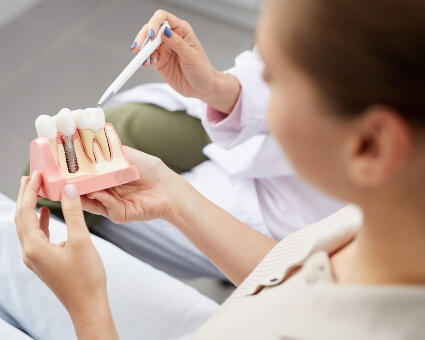
Dental Implants in Maryborough
Dental implants are another option for patients who may be missing one or more teeth and have good oral health. Getting implants can be more invasive than other procedures to replace teeth, such as bridges or dentures, but some patients find it a preferable option for their lifestyle.
How They Work
Think of the implants as artificial roots. The implants are mounted into your jawbone, where the tooth replacement, or crown, will then screw in. With the implant in place, patients don’t experience clatter, slip, further damage to the jawbone, or other noises like dentures or bridgework.
Implants aren’t a fit for everyone, however. Patients with poor oral hygiene, low bone density and those under treatment for certain diseases may not be eligible.
The BioHorizons® Implant Brand
At Pullen Dental, we use an implant brand called BioHorizons, created from titanium. They believe in evidence-based and scientifically proven products and offer a comprehensive portfolio of dental implants and biologics across more than 90 markets worldwide.
What to Expect During Your Implant Process
The process of getting dental implants happens over four to five appointments. During the first, the dentist will take X-rays and assess your bone density for placement of the unit. If there is enough bone density, you will be called back into the office for further X-rays and we will create a plan for you. At this point, you will be asked to pay a deposit for the implant or implants.
The implant is ordered through the lab, and it takes about two to four weeks for them to send the guide. We will bring you in, put the guide into the jawbone, and let it rest for a few months so the bone will fuse to the implant over that period.
During that period, we will have you return every four weeks so we can ensure the bone is fusing well to the implant. We conduct tests to determine how well it’s fused and if it reaches the minimum strength necessary to continue. We then put a crown on top of it and load the implant. You’ll then pay for the remainder of the treatment plan for the implant at this time.
To check the implant, we will have you come in again every three months for the next six months and then during your routine check-ups every six months afterward.
Frequently Asked Questions
Am I a good candidate for dental implants?
Does it hurt to have dental implants?
Can I use my health fund for dental implants?
How long do dental implants last?
Call Us for a Durable Tooth Replacement Option
Our implants typically last up to 20 years and have been a great option for eligible patients looking for durability and long-lasting results. Contact Pullen Dental in today for more information or to schedule an appointment with Maryborough.
Any invasive or surgical procedure may carry risks. Before moving forward, it is recommended that you seek a second opinion from an appropriately licensed medical professional.

